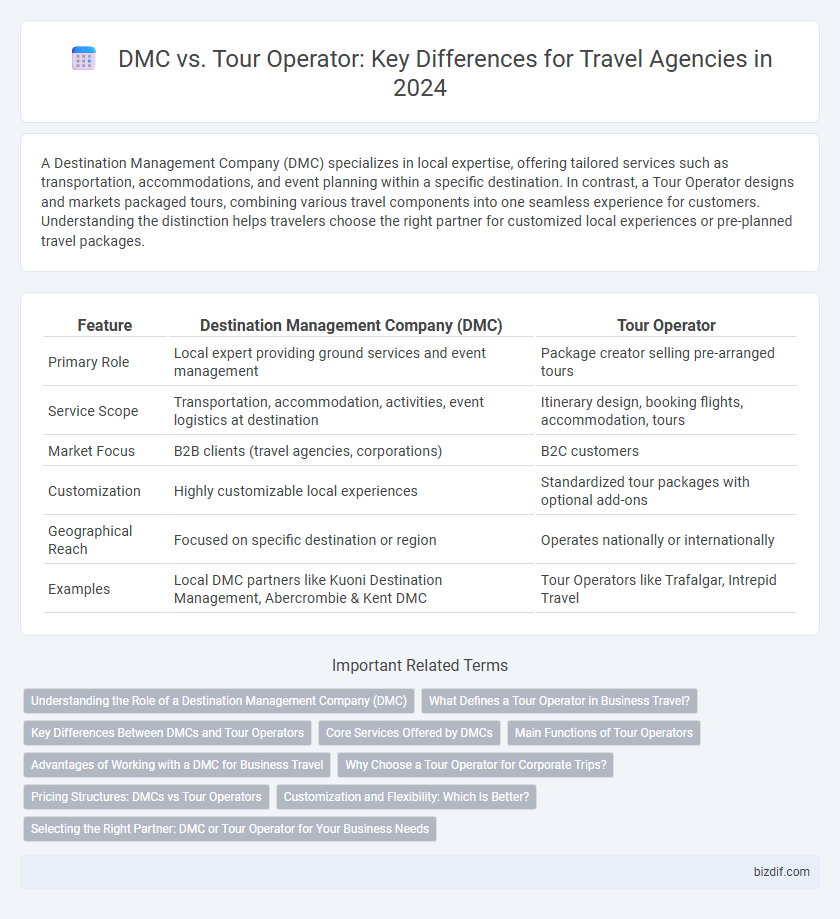A Destination Management Company (DMC) specializes in local expertise, offering tailored services such as transportation, accommodations, and event planning within a specific destination. In contrast, a Tour Operator designs and markets packaged tours, combining various travel components into one seamless experience for customers. Understanding the distinction helps travelers choose the right partner for customized local experiences or pre-planned travel packages.
Table of Comparison
| Feature | Destination Management Company (DMC) | Tour Operator |
|---|---|---|
| Primary Role | Local expert providing ground services and event management | Package creator selling pre-arranged tours |
| Service Scope | Transportation, accommodation, activities, event logistics at destination | Itinerary design, booking flights, accommodation, tours |
| Market Focus | B2B clients (travel agencies, corporations) | B2C customers |
| Customization | Highly customizable local experiences | Standardized tour packages with optional add-ons |
| Geographical Reach | Focused on specific destination or region | Operates nationally or internationally |
| Examples | Local DMC partners like Kuoni Destination Management, Abercrombie & Kent DMC | Tour Operators like Trafalgar, Intrepid Travel |
Understanding the Role of a Destination Management Company (DMC)
A Destination Management Company (DMC) specializes in local expertise, offering ground services such as transportation, accommodations, and curated activities within a specific destination. Unlike tour operators, who design and sell travel packages often encompassing multiple locations, DMCs focus on the logistics and operational execution, ensuring seamless experiences tailored to clients' needs. Their deep knowledge of the destination enables them to manage events, excursions, and cultural experiences with efficiency and authenticity.
What Defines a Tour Operator in Business Travel?
A Tour Operator in business travel specializes in designing, organizing, and selling comprehensive travel packages that include transportation, accommodation, and activities tailored to corporate clients. They act as intermediaries between suppliers and travelers, ensuring seamless integration of services to meet specific business objectives and budgets. Their expertise lies in creating customized itineraries and managing logistics to enhance corporate travel experiences.
Key Differences Between DMCs and Tour Operators
Destination Management Companies (DMCs) specialize in local expertise and on-the-ground logistics, offering tailored services such as transportation, accommodation, and event management within specific destinations. Tour operators design and sell pre-packaged travel experiences, bundling flights, accommodations, and activities often on a larger scale and sometimes internationally. While DMCs provide customized, destination-specific solutions, tour operators focus on creating and marketing complete travel packages to consumers.
Core Services Offered by DMCs
Destination Management Companies (DMCs) specialize in providing local expertise, offering tailored services such as ground transportation, event planning, and cultural experiences that cater to specific destinations. Their core services include arranging accommodation, handling logistics, and coordinating activities to create seamless, immersive travel experiences. Unlike tour operators who package tours, DMCs deliver on-the-ground support and in-depth destination knowledge essential for personalized and efficient travel management.
Main Functions of Tour Operators
Tour operators specialize in creating and selling packaged holidays by combining transportation, accommodation, and activities tailored to travelers' preferences. They handle booking, pricing, marketing, and customer support to deliver seamless travel experiences. Unlike Destination Management Companies that focus on local services, tour operators manage the entire itinerary from origin to destination.
Advantages of Working with a DMC for Business Travel
Partnering with a Destination Management Company (DMC) offers tailored local expertise and on-ground support that ensures seamless business travel logistics and authentic destination experiences. DMCs provide personalized services such as venue sourcing, transportation coordination, and event planning, enhancing efficiency and attendee satisfaction. Their strong local network and cultural insight reduce risks and optimize cost management compared to traditional tour operators.
Why Choose a Tour Operator for Corporate Trips?
Tour operators specialize in creating tailored corporate trip packages, ensuring seamless coordination of transportation, accommodation, and activities to meet business objectives efficiently. Their expertise in handling group logistics and negotiating competitive rates provides cost-effective solutions that enhance employee satisfaction and productivity. Compared to Destination Management Companies (DMCs), tour operators offer comprehensive end-to-end services ideal for managing large-scale corporate events and incentive travel programs.
Pricing Structures: DMCs vs Tour Operators
Destination Management Companies (DMCs) typically offer customized pricing based on local partnerships and on-the-ground services, allowing flexible and often competitive rates tailored to specific client needs. Tour operators usually provide fixed package pricing that bundles accommodation, transportation, and activities, which may limit customization but simplifies cost predictability for travelers. Understanding these pricing structures helps travel planners optimize budgets by choosing between DMCs' bespoke cost models and tour operators' standardized pricing.
Customization and Flexibility: Which Is Better?
Destination Management Companies (DMCs) offer highly customized and flexible travel solutions tailored to specific client needs, leveraging local expertise to create unique experiences. Tour operators typically provide pre-designed packages with limited customization options, focusing more on volume and standardized itineraries. For travelers seeking personalized, adaptable trips, DMCs generally provide superior flexibility compared to traditional tour operators.
Selecting the Right Partner: DMC or Tour Operator for Your Business Needs
Selecting the right partner for your travel business hinges on understanding the key differences between a Destination Management Company (DMC) and a Tour Operator. A DMC offers in-depth local expertise, ground services, and customized destination experiences, making them ideal for client-specific events and seamless logistics within a region. Tour Operators focus on packaging and selling a range of travel products, often including flights and accommodations, which suits broader market reach and pre-designed itineraries.
Destination Management Company (DMC) vs Tour Operator Infographic

 bizdif.com
bizdif.com